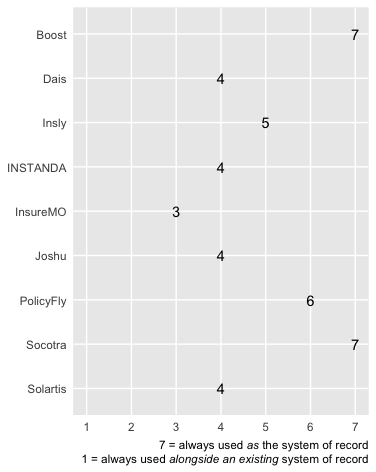What It Is
An API, or application programming interface, is just a structured way for two applications to talk to each other. For example, your quoting engine might ask your rating engine for premiums on a quote. All APIs have this same structure: a client-side application sending a request, and a server-side application sending a response. The content of an API request or response is called its payload.
Policy Data
To say you have a system of record is to say you have a source of truth for your data. You'll need to consider this data from at least three angles.
- You want to make sure the data's available in production, of course. You need to run the business daily and attend to your insureds
- You also need to make sure you're collecting the data you need for statistical reporting, and can share it with the appropriate regulatory bodies.
- But because this is insurance—which is uniquely dependent on the proper data and actuarial science—you need to make sure you have open access to pull your policy data yourself.
Other Systems of Record
Your system of record for all things policy-related does not have to be the same as your systems of record for other parts of your business:
- your sales funnel,
- customer communications,
- billing,
- customer feedback (VOC),
- or claims.
If you buy, your policy software vendor may handle these as well. Or you may choose to put together your own stack of targeted solutions. Either strategy has merits; the only critical part is that the systems you use talk to each other.
Multiple Policy Systems of Record
It sometimes happens that an insurer has multiple systems of record, even just for policies. The insurer was on Policy Software A for Insurance Products 1–3, but when they expanded to Product 4, Software B was a better fit. So now there's a split: some policies and products on A and others on B. This can be a pain, but there are things you can do to mitigate that headache. See modularity for more.
Differences Among Vendors
Some policy software vendors, especially those who consider themselves "Policy Admin Systems," prefer to act as your system of record for policies. Others are happy to work alongside an existing system of record. And in that way they can complement your system of record quite nicely. (Again see modularity for more on this approach.)
We ask each vendor we work with, on a scale of 1 to 7, how often their clients use them as a system of record and how often they're used alongside an existing system of record. Here are the results:
